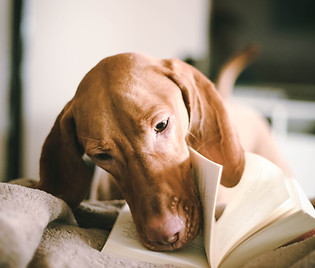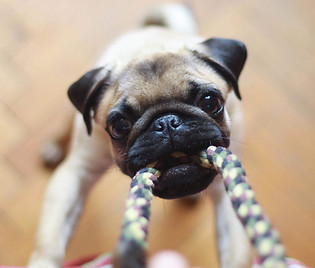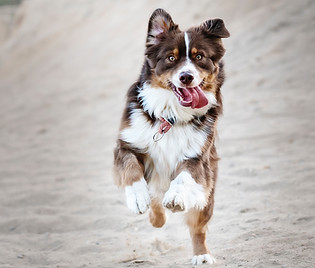
DOG BEHAVIOUR PROBLEMS
Have you ever thought to yourself, "I wish my dog would stop doing *fill in the blank* "? If you have, you're in the right section! Below is a list of common dog behaviours and what they might look like; please note that your dog may not fit neatly into any of these categories or might fit into multiple, and that's okay! We always conduct individual assessments and alter our training plans so that they are the most effective for you, your dog, and the situation. For that reason, you must call or email us to book a consultation (ALWAYS required before any advice can be provided)

Leash Problems
-
Leash pulling
-
Running around or "going crazy" on the leash
-
Barking at people, dogs or items
-
Car chasing
-
Biting the leash
-
Refusing to move

Excessive Vocalization
-
Barking
-
Howling
-
Whining or crying
-
Growling
-
Yipping

Voiding Issues
-
Peeing or pooping on the carpet/floor (indoors)
-
Marking furniture or other inappropriate items
-
Asking to go outside excessively (e.g., barking at the door non-stop)
-
Wetting their bed or crate

Separation Anxiety
-
Excessive barking or whining
-
Digging
-
Self-mutilation
-
Voiding
-
Destroying things (e.g., chewing pillows)
-
Can't be separated from you
-
Extravagant greetings when you come home

Destructive Behaviours
-
Digging up lawn
-
Shredding or chewing inappropriate items (e.g., socks, the couch, trash)
-
Self-mutilation

Doesn't Listen
-
Ignores you
-
Looks at you but does nothing (e.g., you say "come" and the dog keeps walking away or just stares at you)
-
Barks or "complains" when you ask them to do something

Fear
-
Barking or whining
-
Running away or hiding
-
Leash pulling
-
"Going crazy"
-
Growling, biting, or any aggressive behaviour
-
Drooling, panting, tail between legs

Self-Mutilation
-
Excessively licking, biting or chewing themselves
-
Digging so much they rip open their paw pads
-
Scratching themselves
-
Ripping out their own fur

Jumping
-
Jumping up on people when they enter the house
-
Knocking people over during play
-
Jumping to grab food or toys out of your hands
-
Counter-surfing

Constant Attention Seeking
-
Stealing inappropriate items like socks (the "keep-away"game)
-
Vocalizing
-
Being destructive
-
Poking or pawing at you
-
Jumping on you

Aggression
-
Biting, snapping or nipping
-
Barking, growling or snarling
-
Baring teeth
-
Lunging
-
Predatory behaviours
-
Guarding people, places, toys or food

Other Issues
-
Begging at table
-
Crate training problems
-
Dog wasn't socialized at all or was poorly socialized
-
Not "getting along" with other animals (e.g., chasing cats, fighting with other dogs)
-
Can't groom them (e.g., brush, bathe, or clip nails)
-
Many, many, more...
TRAINING NEW SKILLS
Dog training is a great way to bond with your dog and increase listening skills through teamwork. Teaching your dog practical skills can help you manage problem behaviours, and in some cases, stop them before they even start. If your dog has any problem behaviours (99% of dogs do!), teaching your dog what to DO can be a game changer. Plus, if we want to be honest, it's always nice to show off some cool tricks your dog can do!
All of our training is done through positive reinforcement. We are also holistic, which means we consider the WHOLE DOG and their HUMAN; we assess your pet's overall health, diet, genetics, learning environments, current skillset, their mental and physical needs, sleep quality, reinforcement history, and their handler's skills. We also prioritize the mental well-being of your pet and YOU.
Below are some sample behaviours we can help you train. Just know that there are so many behaviours not included that your dog can learn. If you don't see the behaviour you want to train on the list, feel free to call or email us with an inquiry. If you need help with a problem behaviour, our behaviour consultant can help you choose what skills your dog should learn to be successful.

Sit
Sit is a fundamental behaviour that can be used as a foundation for training other behaviours (e.g., "beg"). You can use sit to prevent your dog from jumping up on people or to get them to stay in one area until they are released from that position.

Down
Lying down can be used to train your dog to stay in their bed or in a designated area. The position can also be useful for grooming (e.g., nail clipping) or during times that you need your dog to relax.

Wait (or Stay)
Getting your dog to remain in one location can save you in sticky situations (e.g., you drop a piece of chocolate on the floor, or there's a squirrel your dog might chase). You can also get your dog to wait while you pour their food so they are not in your way.

Your Bed (or Spot)
Training your dog to go to their bed/spot can be used in many practical ways. For example, use when you are in the kitchen and don't want your dog to get under your feet, touch the oven, or try to take food. It can also be used to calm dogs when you have guests at the front door, plus way more!

Leave it
Drop something on the floor that your dog shouldn't eat? Have a dog that puts everything in their mouth while you're out for a walk? "Leave it" is the cue for you! This cue is important as it can save your dog's life if you need them to stay away from something dangerous.

Drop and Take it
Nothing should ever be forcibly taken out of a dog's mouth, unless it's an emergency. "Drop" and "take it" can be trained together and can be used to get your dog to release items (e.g., toys, tissues, sticks, etc.) out of their mouth.

Off
Is there no room for humans on your couch or bed anymore? Teach your dog "off" so that you can easily make space for yourself by getting your dog to jump off. This cue is extremely useful if you have a dog that guards locations like the couch or bed.

Come
Recall is one of the most essential cues you can train. It's great for emergency situations in which you need your dog to come to you ASAP. It's also helpful to call your dog for their meal or playtime.

Their Name (or Watch Me)
Attention is extremely important when you are cueing your dog to do something. If your dog is not attending to you, they won't do what you ask. By training them their name, or a "watch me" cue, you can easily get your dog's attention and have better control over their next behaviour.

Void on Cue
No one wants to wait forever while their dog carefully picks the perfect spot to eliminate. If you want to speed up the process, training them to void on cue will definitely help.

Heel
Leash pulling can be quite annoying and cause strain on your arm. If you are a small person, and your dog is large, you might not be able to hold them. By teaching your dog to heel, you can have your dog walk nicely beside you and save yourself (and dog) from getting injured or frustrated.

Cool Tricks!
This is the fun part! Once your dog knows the all the essentials, you can start training them cool tricks. It's always nice to show off a little, right?
SOCIALIZATION
Some behavioural problems stem from improper socialization or aversive exposure to the environment. If the dog (or cat) does not interact with enough animals or people in a reinforcing, positive way, this can cause many issues down the road. Bad experiences (e.g., abuse) can also condition animals that social experiences are bad or punishing; while these problems might take longer to resolve and require rehabilitation (counter-conditioning), we would love to help your dog.
Critical socialization periods occur when the dog is still a puppy. It's important that fear and aggression are handled properly, especially during these puppy stages. If you have a puppy, it is highly recommended that you enroll them in puppy school as it provides many socialization opportunities and educates pet parents on how to train their dog and how to react in different situations (e.g., your puppy gets scared or starts growling).
Regardless of whether you have a puppy or have an adult dog that needs socialization, please contact us. We always assess the situation and create training plans specifically for you and your dog.
CANINE AGGRESSION
Aggressive dogs are dangerous to everyone, especially the elderly and children. It can be very scary to share a home with a dog who could potentially hurt someone. If you think your dog is exhibiting aggressive behaviour, it is very important to seek help as soon as possible; aggressive behaviours generalize fast, meaning that your dog might start getting aggressive in more and more situations very quickly. If handled incorrectly, someone could get hurt, or even killed.
It's important to realize that any dog can bite or exhibit aggressive behaviour. It's NOT the breed of dog that causes them to be aggressive or a specific "personality trait" that they have; instead, aggressive behaviour is affected by so many factors like their conditioning history (what the dog has learned and experienced throughout their life), the environment they are in, their health & diet, and unmet needs. This is why Guidance analyses why your dog is exhibiting aggressive behaviour. Once we know why aggressive behaviour is happening, we can help create a plan for behaviour change and build a safer environment for everyone, including your pet.
As with any behaviour, a consultation is required. This ensures that you get the best advice possible that's geared to you, your dog, and the situation you're in. To book a consultation, visit our contact page and talk to our trainer, Sam, who specializes in aggressive cases.



SAFE INTRODUCTIONS
Getting a new pet is always exciting. You're probably hoping to see your two pets cuddle or play together, but the truth is, this doesn't always happen. Just like people, animals' personalities can clash. That being said, there are a few things that we can do to create an environment that will make friendship more likely (and no, it's not just putting the two animals in a room and letting them sort it out - this usually ends poorly).
Before letting your pets meet for the first time, it is important to contact a behaviour consultant to ensure the introduction is gradual and as errorless as possible (we want your pets to make good first impressions). Although we can't guarantee your animals will be best friends, we can guide them in that direction.


Pricing
Consultations are typically 1 hour long and are always free (they cost you nothing!). We come to your house/apartment. The purpose of the consultation is for us to collect more detailed information about you and your pet(s). It also gives you a chance to ask us questions and see if we're right for you and your pet. Be prepared to answer as many questions as you can about your pet's behaviour; part of helping your pet is answering the 5 basic questions (Who? What? Where? When? And why?). If you don't know the answer to something, don't worry! This is a non-judgemental zone. Taking notes about your pet's behaviour or taking videos of it prior to the consultation can be helpful. NOTE: It is important not to instigate the problem behaviour on purpose just for the sake of taking a video (we don't want to intentionally cause discomfort or allow the pet to practice undesirable behaviour).
First Training Session: The first training session is 1 - 3 hours long, and is $150.00 + HST. This session goes over a lot of training foundations. Appointments are typically at your house. If not, they are held at an agreed upon location (e.g., a public park). During this session, the trainer will demonstrate training exercises for you to practice with your pet.
Subsequent Sessions: Each training session after the first session is $55.00 +HST for 30 minutes (sometimes longer depending on how long we need to go over the next training steps). You will NEVER pay more than $55.00 +HST, regardless of how long this session is. There is no obligation to book a certain amount of training sessions. You book the sessions as you need.
Exposure Sessions: These sessions are typically used for reactive dogs. They are shorter sessions, ~15-30 mins long, that work on desensitization/counterconditioning. These sessions are booked more frequently (e.g., multiple times a week), so they are cheaper. They are $30 + HST per session.
If you have any questions before or after training sessions, phone calls/texts addressing these are free. You will have free access to a client portal that allows us to communicate between sessions. We always want to provide clear instructions, so if there is something that you need more clarification on, we will gladly take your call free of charge. We would also be happy to answer any questions you have regarding our services or training methods!



